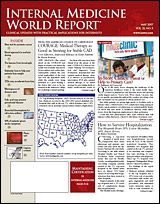Weight Loss: What Works & What Doesn't for Diabetic Patients
If you have diabetes and you are overweight, losing weight will make you feel better, will help control your blood sugar, and will lower your risk of developing the complications of diabetes, as well as reduce your risk for cardiovascular disease.
It is very hard to lose weight, and it's even harder to not regain weight after you've lost it. Studies of overweight and obese persons have identified the best ways to lose weight and to maintain that weight loss.
What Is the Best Weight-Loss Diet?
There are different kinds of diets, and some work better for some people than for others. The low-calorie, low-fat diet is the one that has been the most successful for the most people. This diet is made up of the following:
? 55% or more carbohydrates
? 15% protein
? 30% or less fat.
If you cut 500 to 1000 calories every day out of your diet, you can lose 1 to 2 pounds every week. While you're dieting, you can still eat many of your favorite foods. All you have to do is pick lower-fat, lower-calorie alternatives, for example:
Higher-fat food
Lower-fat, lower-calorie alternative
Whole milk
Low-fat (1%), reduced-fat (2%), or fat-free (skim) milk
Ice cream
Sorbet, sherbet, fat-free frozen yogurt (check label for calorie content)
Sour cream
Plain low-fat yogurt
Whole milk ricotta cheese
Part-skim milk ricotta cheese
Ramen noodles
Rice or pasta (spaghetti, macaroni, etc.)
Pasta with white sauce
Pasta with red sauce
Granola
Oatmeal, bran flakes
Oil-packed tuna
Water-packed tuna
Regular ground beef
Extra-lean ground beef (ground round) or ground turkey
Bacon or sausage
Canadian bacon or lean ham
Spareribs
Lean smoked ham
Whole eggs
Egg whites or egg substitutes
Donuts
English muffins, bagels
Chocolate cake
Angel food cake
Cookies
Graham crackers
Nuts
Air-popped popcorn
Regular mayonnaise
Light/diet mayonnaise or mustard
Canned cream soups
Canned broth-based soups
The Dos and Don'ts of Weight Loss What you should do: ? Eat more fruits and vegetables
? Eat smaller portions
? Use prepackaged, easy-to-prepare, low-calorie meals
? For some people, eating frequent small meals results in more weight loss than eating 3 large meals a day
What you shouldn't do: ? Don't skip meals, especially breakfast?it's hard to control how much you eat at lunchtime if you're really hungry
? Don't drink sugar-sweetened drinks
? Reduce the number of food choices in your diet; the more variety you have, the more you're going to eat
? Don't eat out in restaurants more than 1 to 2 times per week.
How Much Exercise Do I Need to Lose Weight?
You don't have to run in a marathon to lose weight. Start out by increasing the number of steps you walk each day by about 200 to 500 steps. For example, at first, try walking for 30 minutes a day 3 days a week. Then you can slowly increase the number of steps until you're walking about 45 minutes a day 5 days a week. This can burn 100 to 200 calories a day.
Other ways to increase daily physical activity include:
? Using the stairs instead of the elevator
? Playing outside with your children instead of watching TV
? Start playing tennis or another sport that you'll enjoy
One of the most important things about exercise is that, once you've lost weight, it is essential for keeping the weight off.
Keep Track of What You're Doing
One of the best ways to lose weight is to keep a diary of your daily activities. Write down when you eat, what you ate, and how you felt when you were eating. Make a note of when you exercised, for how long, and what you did. Eating too much or eating the wrong things become habits. Sitting in front of the television is another habit. You don't even realize you're doing these things. When you record these activities, it forces you to think about them, and you're less likely to do the things that are bad for your health. Recording these events in a diary can help break the habits of eating too much and not getting enough exercise.
What About Weight-Loss Drugs and Weight-Loss Surgery?
Some drugs can help you lose weight, but you can't use them forever. And they only work if you are also eating a low-calorie, low-fat diet and are getting more exercise. Weight-loss drugs are not magic pills that will solve your problems. Most people can lose weight by just changing their behavior.
Weight-loss surgery (sometimes called "stomach stapling") is a drastic and irreversible procedure. You should only consider it if you are obese and cannot lose weight. It should only be used as a last-ditch effort to prevent serious medical complications.
Do These Things Really Work?
Sure, doctors and scientists say that diet and exercise can help you lose weight, but will these things work for you? According to thousands of overweight and obese people who have lost weight and kept it off, the answer is "yes."
These people are part of an online registry of 5000 men and women who have lost more than 30 pounds and have maintained that weight loss for more than 1 year. On average, they have lost about 60 pounds. None of them had surgery to lose weight.
When these successful dieters were asked what were the most important factors that enabled them to lose weight and not regain it, they named 4 things:
1. Self-monitoring?keeping a food and exercise diary
2. Following a low-calorie, low-fat diet
4. Eating breakfast every day
5. Regular physical activity (walking about 4 miles per week)
More Helpful Information
The National Institutes of Health has lots of weight-loss guides for patients: www.health.nih.gov/result.asp/725
You can download 14-day meal planners at: www.xenical.com/sample_diets.asp
